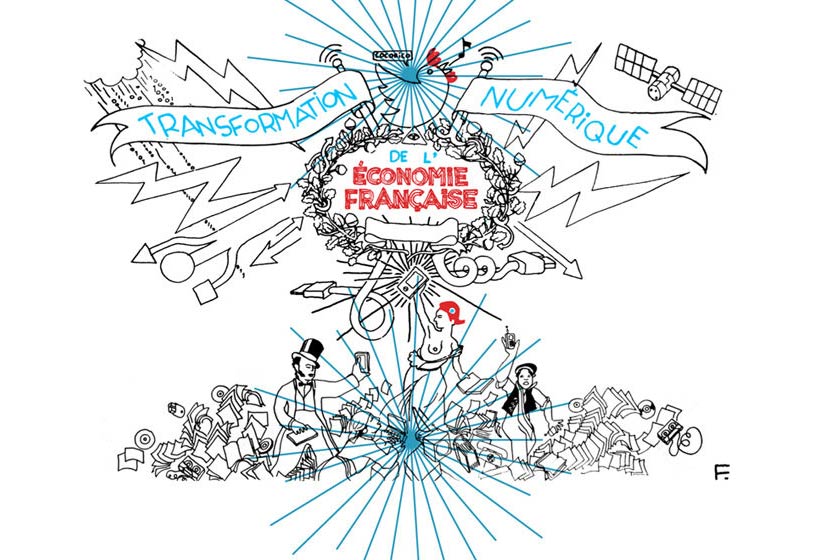Today, the Richelieu Committee Observatory submits its annual report, produced in collaboration with GAC Group, on the Government's Commitments and Actions in the Service of Innovation and Growth, "Government Commitments and Actions: New Debates and Advances on the Margins".
The past year was marked by three movements: the continued deployment of the National Pact for Growth, Competitiveness and Employment presented in 2012 by the Prime Minister; the follow-up to the Assises de l'Entrepreneuriat with the presentation of the New Deal for Innovation; and the opening of debates on administrative simplification and the responsibility of the various players in society with a view to efforts to promote growth, competitiveness and employment.
While commitments and actions continue to cover many areas - financing, taxation of research and innovation, relations between public purchasers and SMEs, and the dynamisation of the innovation ecosystem with the "French Tech" initiative - the interweaving of issues and the opening of several debates seem to have a dilatory effect on the implementation of the clear and strong measures expected by the EICs. These include directing savings towards innovation, promoting innovative public procurement and reducing costs for the companies most capable of sustaining growth and strengthening the country's competitiveness.
Faced with the expectations and scepticism expressed by entrepreneurs in the 2013 report, the Observatory regrets that the messages launched last year have been heard only too partially. It is true that the Mediation of Innovation is being put in place, but on the other hand, the CICE, the Government's flagship measure, continues to exclude company directors and employees - mainly engineers and researchers - whose income is more than 2.5 times the SMIC from its calculation. Admittedly, the target of 2 % of innovative public purchases allocated to SMEs/ETIs is reduced from 2020 to 2017, but no annual target is publicly stated. Finally, while the innovation tax credit (CII) is being rolled out, it is also noted that the concrete and clear orientation of French savings towards innovative companies is too little perceptible.
Perception of entrepreneurs: trust is tested
87% believe that the Pact for Growth, Competitiveness and Employment has not responded well to the needs of their company.
66% believe in the sustainability of the research tax credit
20% used the innovation tax credit
53% see FrenchTech as an asset for their international development
67% would have preferred another device than the CICE
In the light of the results of the survey carried out among a representative panel of EICs over one year of government action, the Observatory would like to draw the attention of public authorities to the expectations and needs of innovative enterprises for the creation of an environment favourable to their development.
This second edition offers, on the one hand, an opportunity to give the entrepreneurs who responded to the survey a chance to step back and, on the other hand, to assess the evolution of their perceptions.
While schemes such as the research tax credit (RTC) or international development aid are still popular, trust is being tested. The relevance of the CICE is widely questioned. Fears about the future of the RTC are diminishing but dying. Finally, the ICN is only slightly "taking off".
The need for stability is confirmed...
Research tax credit: on reading the comments of the entrepreneurs questioned, the Observatory notes that the RTC continues to be the subject of a veritable plebiscite. 74 % of companies consider it indispensable or useful for their activity. Doubts remain about its stability and durability, even though in each case more than half of the companies believe that the system is stable (61 %) and durable (66 %).
Bpifrance and innovation financing: when asked about the impact of the centralization of Bpifrance's activities on access to innovation financing, companies are only in the minority. 29 % believe that centralisation facilitates this access in the case of aid and guarantees, 32 % in the case of loans, 28 % in the case of export-related schemes and 17 % in the case of capital investments.
Innovation tax credit: introduced in the Finance Act for 2013, this measure had been relatively well received, given that 42 % companies planned to use it. One year later, 20 % of them indicated that they had used it. Those that said they had not used the system mentioned a "difficult to read" scope and "difficult to understand" rules.
"additional complications" for their business.
Young Innovative Company (JEI) status: at the end of 2013 (cf. 2014 finance law), we were delighted to see the JEI status return to the conditions that prevailed in 2010. We note once again that instability is detrimental as 16 % of companies declare to be aware of it.
...and trust is tested...
At a time when the Government is announcing a Shock of Simplification, we could have been looking for a renewal of confidence. Unfortunately, the results of the survey indicate that it is being significantly tested.
National Pact for Growth, Competitiveness and Employment Against 21 % in the rap- port 2013, only 13 % of the companies that responded to the survey believe that the pact - a major act of the Government's commitment - meets their expectations and needs.
CICE The CICE was used by 78 % companies in 2013 and 54 % of them indicate that it enabled them to increase their working capital. Moreover, 67 % of companies would have preferred another device such as a reduction in charges (70 %) or a CICE at 3.5 times the SMIC (19 %).
Innovative public procurement The objective of 2 % of innovative public procurement allocated to SMEs/ETIs is struggling to be achieved by 2017. While no company reported perceiving the effects in our 2013 report, 1 % indicates that it is "starting to feel the effects" of this measure.
French Tech French Tech: an initiative hailed by the Richelieu Committee and GAC group, French Tech, a strong government measure in favour of innovation and growth start-ups, has yet to convince as only 11 % of innovative companies believe that it will have a positive impact on their business. Of those that believe that French Tech will have such an impact, 53 % see it as an asset for their international development.
Mediation of innovation (extension of the mission of Inter-company Mediation to innovation): while it was set up in March 2014, 12 % of the companies surveyed are familiar with it. Among the expectations of the companies, the establishment of a CIR/CII roadmap to simplify access (31 %), the resolution of disputes between public players and innovative companies (20 %) or the resolution of disputes related to intellectual property (19 %) are among the most important.
The Observatory team
- For the Richelieu Committee: Jean Delalandre, General Delegate; Sophie de Guillebon, Head of Partnerships and Events
- For GAC Group: Michel Peltier, head of monitoring and studies
Why an observatory?
In November 2013, the Observatory presented the first report of the Government's commitments and actions in the service of innovation and growth, independently set up by the Richelieu Committee and GAC Group.
It was noted that the initiatives taken by the Government covered a broad spectrum, from commitments - the National Pact for Growth, Competitiveness and Employment - to ongoing actions - from the establishment of CICE to the creation of Bpifrance. It was also noted that there were high expectations as well as scepticism on the part of entrepreneurs who feared the instability of the measures or the slow pace of their implementation.
The 2014 edition again comprises three parts: one on commitments, another on government actions and finally the third presenting the results of a survey of innovation and growth companies (EICs).
This second annual report, based in particular on the New Deal for Innovation announced by the Government from November 2013, intends to play its full role: to raise awareness, inform, alert, challenge, report and finally encourage innovation stakeholders and policy makers to better understand each other and work together in the service of innovation, growth and competitiveness.
Access to the Report : www.comite-richelieu.org












